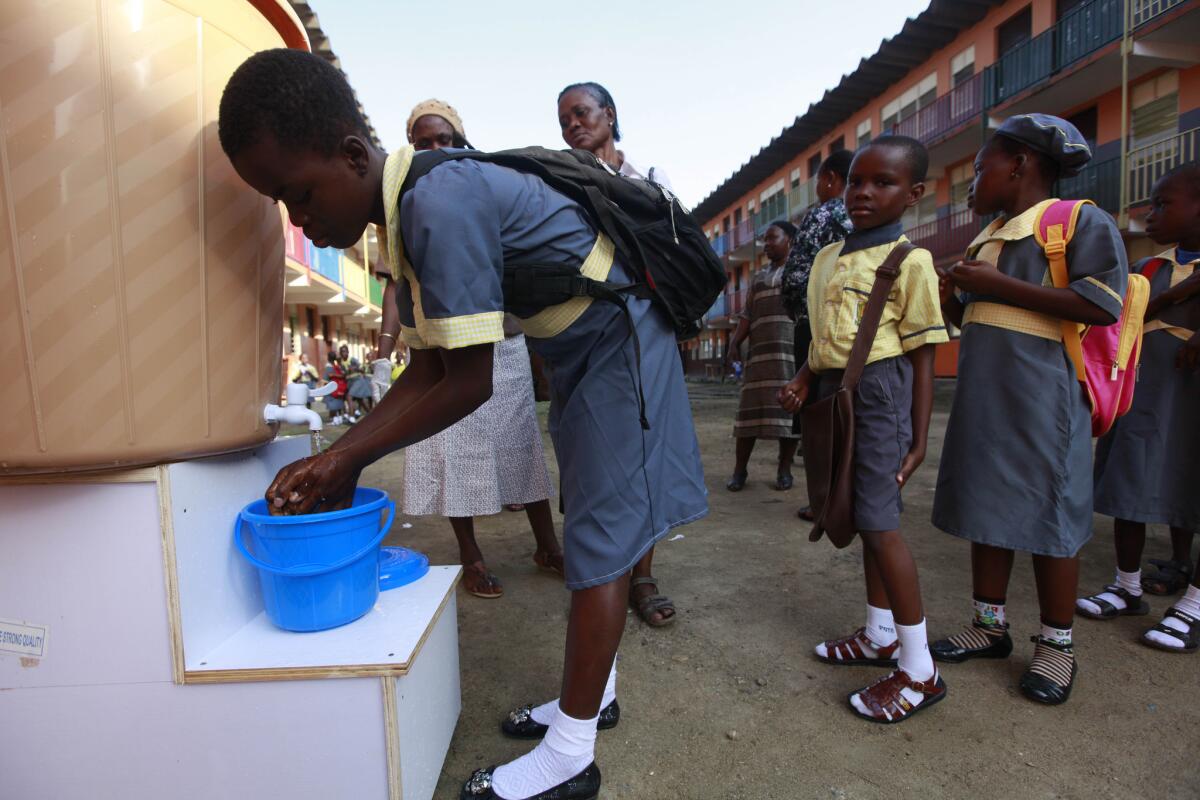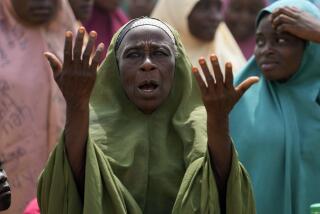Ebola-free Nigeria hailed as ‘success story’ in battling outbreak

- Share via
Reporting from Johannesburg, South Africa — It was an epidemiologist’s worst nightmare: one of the world’s deadliest contagious diseases loose in one of the world’s most densely populated and sometimes chaotic megacities — Lagos, Nigeria.
With its teeming slums, bogus pastors selling miracle cures, six-hour traffic jams and street vendors hawking goods at car windows, some feared an apocalyptic urban outbreak and the spread of Ebola into Nigeria’s highly mobile population of 170 million, which could entrench the disease in West Africa for years.
But in an extraordinary success story, Nigeria contained the Ebola outbreak and was declared free of the virus by the World Health Organization on Monday, after 42 days without a new case (double the incubation period for Ebola). Nigeria confirmed 19 cases, according to the WHO, seven of them fatal. That survival rate of 63% is more than double the 30% average in other West African countries
The top-down effort took political determination, the redeployment of doctors and facilities from Nigeria’s polio-eradication campaign, a vast contact-tracing operation involving members of the State Security Service, tens of thousands of text messages sent out to educate people on prevention, and some hefty donations from wealthy Nigerians.
And just a little bit of luck.
The WHO hailed Nigeria’s “spectacular success story” and the country’s “world-class epidemiological detective work.” Nigeria has also reduced polio cases and eradicated guinea worm.
“If a country like Nigeria, hampered by serious security problems, can do this — that is, make significant progress towards interrupting polio transmission, eradicate guinea worm and contain Ebola, all at the same time — any country in the world experiencing an imported case can hold onward transmission to just a handful of cases,” Dr. Margaret Chan, WHO director general, said in a statement Monday.
At the outset, things looked bad. When Ebola hit Lagos, the country was in the middle of a strike by doctors and nurses. Dr. Doyin Oduyebo, a microbiologist at the forefront of the Nigerian effort to contain the virus, said medical authorities initially feared the disease would race out of control.
“We were afraid because we knew the epidemic was raging in other West African countries,” Oduyebo said in a phone interview. “So we decided to give it everything to bring it under control.”
The crisis began July 23, when a Liberian American named Patrick Sawyer, who was so sick when he left Liberia that he was lying on the floor in the departure lounge, vomited during his flight and collapsed in the airport upon arrival in Lagos.
Sawyer was on his way to a conference of the Economic Community of West African States, or ECOWAS, in Calabar, southeastern Nigeria. He was met in Lagos by two ECOWAS officials and escorted by private rental car to the private First Consultant Hospital, vomiting en route. One ECOWAS official, Jatto Abdulqudir, would later die of Ebola.
Dr. Morris Ibeawuchi examined Sawyer at the hospital. Sawyer and the ECOWAS protocol official with him concealed the fact that he’d collapsed at the airport, and Sawyer lied about the fact that he had been in close contact with an Ebola victim, Ibeawuchi told a Lagos news conference last month. Sawyer claimed he had malaria.
In fact, he had visited his sister as she lay dying of Ebola in Liberia and had taken part in her traditional burial.
On Day 3, when Sawyer’s lab results came back positive for Ebola, he decided to leave the hospital. At one point, a doctor forcibly restrained Sawyer as he tried to tear out his intravenous drip in a bid to escape. Sawyer died five days after arriving in Lagos. Dr. Stella Adadevoh, who had restrained him, died the following month.
Also destined to die was a nurse, Justina Echelonu, who treated Sawyer — her first patient on her first day on the job at the hospital. She was two months pregnant.
Ibeawuchi became ill too, his temperature soaring. “There was a night I thought my existence on this earth had ended,” he would later recall. But he survived.
As news spread that Ebola had reached Nigeria, the country’s social media went into overdrive. Skeptics asked: How could a government that couldn’t recover 219 schoolgirls kidnapped by extremists in April hope to contain Ebola?
A pastor claimed on Facebook that he had a “Solution to Ebola!” — laying hands on the sick. Another “solution,” circulated by text message, advised people to drink as much salt water as they could. Two people reportedly died from that approach.
“There were a lot of rumors, which we dispelled,” said Oduyebo, of the government response team. “There was a major public awareness campaign. Virtually everybody in Lagos became aware that there was something called Ebola and that they had to take preventive measures. People ensured that they washed their hands.”
News conferences were called to dispel misinformation, a hotline was set up and at least 57,000 Nigerians received multiple government text messages educating them about the virus.
A government command center was established, with twice-daily coordination meetings. Resources dedicated to polio eradication and HIV, including 40 doctors trained in epidemiology, were swung into the fight and more than 150 contact tracers monitored contacts.
In late August, Nigerian health workers called off their strike in response to the crisis.
By then, Ebola had spread to Port Harcourt, when a second ECOWAS official who had met Sawyer flew to the country’s main oil production hub and was treated by a private doctor, who would later sicken and die. An elderly Port Harcourt woman died after sharing a hospital ward with the doctor.
In all, Sawyer had contact with only 20 Nigerians, but their contacts ran into the hundreds. Tracking down every single Lagos contact, and 98.5% of the Port Harcourt contacts, and following up with thousands of face-to-face meetings to ensure the contacts hadn’t developed Ebola, was the key to Nigeria’s success.
“People followed every contact tracing through,” Oduyebo said. “They had to use the State Security Service to make sure every case was followed. We used serious means.”
The United States and other countries donated infrared thermometers for airport and border screening, and Nigerian billionaires Aliko Dangote and Tony Elumelu donated $900,000 and $300,000, respectively, to halt the virus. Oil and cellphone companies also donated, fearful of the disease’s effect on Africa’s biggest economy.
And perhaps luck played a role. Had Ebola entered Nigeria by road instead of air, with a patient seeking treatment at a remote rural clinic instead of a private hospital in Lagos, the outcome might have been different.
It was lucky that nobody who flew on the Arik Air flight with Sawyer from Liberia contracted Ebola after he vomited on board.
Political timing may also have played a role. After being criticized for complacency in the schoolgirl kidnappings, Nigerian authorities were determined to act decisively. And with elections approaching in February, President Goodluck Jonathan, widely expected to seek a second term, couldn’t afford an Ebola disaster.
This time, his name seemed apt.
More to Read
Sign up for Essential California
The most important California stories and recommendations in your inbox every morning.
You may occasionally receive promotional content from the Los Angeles Times.










